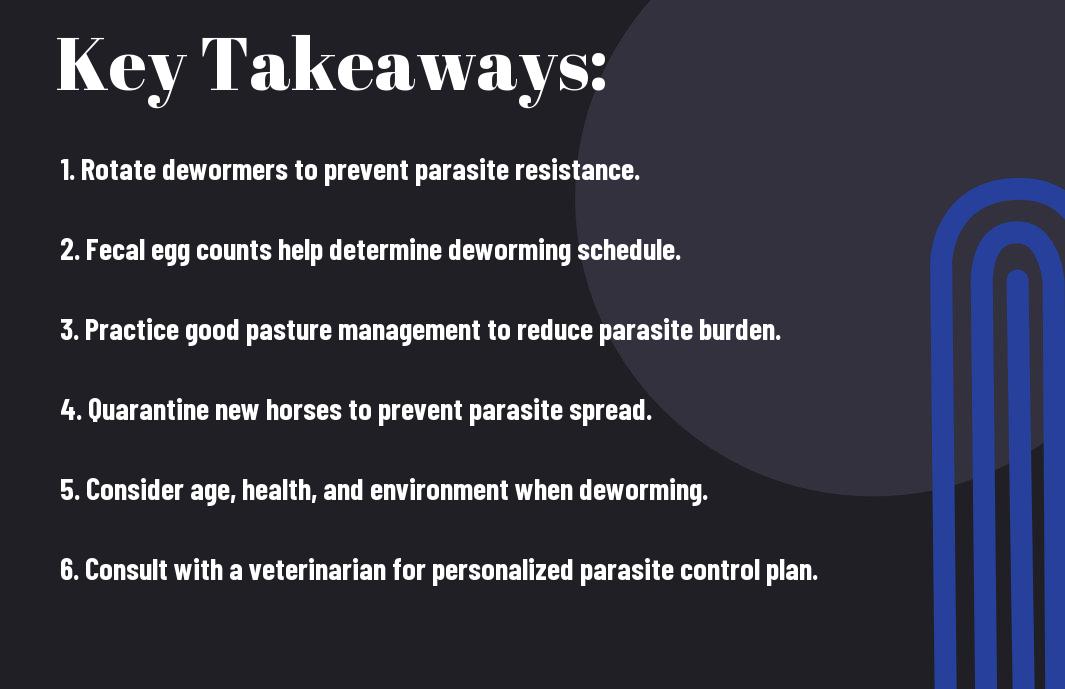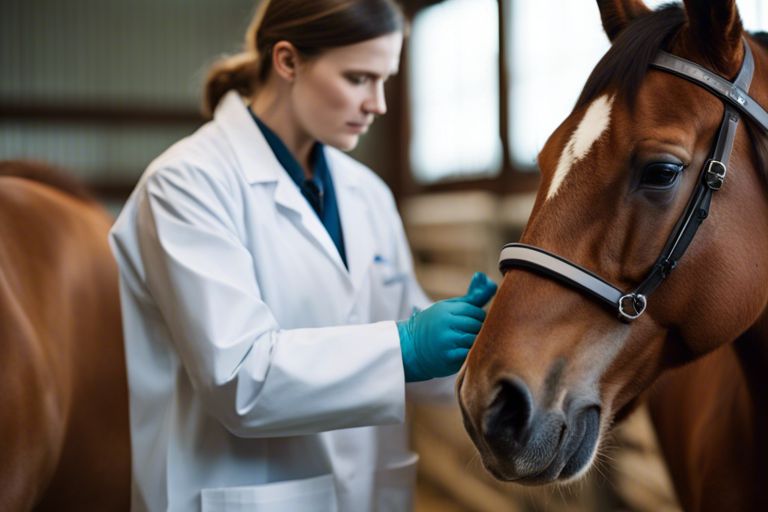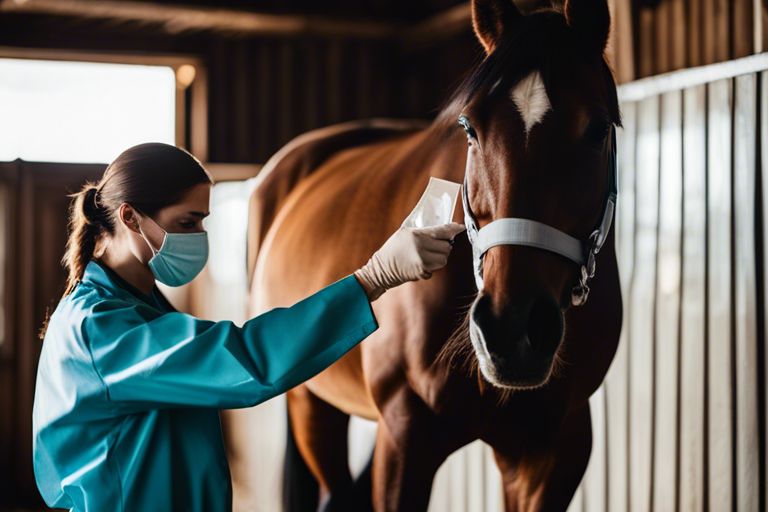Just like with any animal, your horse’s health is of utmost importance. You must be proactive in managing equine parasites to ensure your horse remains healthy and happy. In this guide, you will learn crucial tips for your horse’s parasite management, from deworming schedules to pasture management practices, to keep your equine companion in top shape.

Identifying Parasites
While parasites are a common issue in horses, identifying them early is crucial for effective treatment. Understanding the types of parasites your horse can be affected by and recognizing the signs and symptoms of infestation are key steps in managing their health.
Common Types of Equine Parasites
- Strongyles: These are the most common and harmful internal parasites in horses.
- Tapeworms: These parasites can cause intestinal obstruction and other health issues.
- Bot Flies: These insects lay eggs on the horse’s coat, which are then ingested when the horse grooms itself.
- Pinworms: These parasites lay their eggs around the horse’s anus, leading to itching and discomfort.
- Roundworms: They can cause digestive disturbances and poor growth in young horses.
This table breaks down the common types of equine parasites:
| Parasite | Description |
|———–|—————————————-|
| Strongyles | Most common, harmful internal parasites |
| Tapeworms | Can cause intestinal obstruction |
| Bot Flies | Lay eggs on the horse’s coat, ingested during grooming |
| Pinworms | Lay eggs around the horse’s anus, leading to itching |
| Roundworms | Cause digestive disturbances in young horses |
Signs and Symptoms of Parasite Infestation
Common signs and symptoms of parasite infestation in horses include weight loss, poor coat condition, lethargy, colic, and diarrhea. It’s crucial to monitor your horse regularly for any changes in behavior or appearance that could indicate a parasitic issue.
This information will help you stay vigilant and take prompt action if you suspect your horse may be suffering from a parasite infestation. Regular fecal testing and deworming based on veterinary recommendations are crucial components of your horse’s parasite management program.

Prevention Strategies
Now, when it comes to managing equine parasites, prevention is key. By implementing a few key strategies, you can help protect your horse from suffering the negative effects of parasite infestations.
Implementing a Regular Deworming Schedule
An crucial part of parasite prevention is establishing and adhering to a regular deworming schedule. Consult with your veterinarian to create a customized deworming plan tailored to your horse’s specific needs. **Strong**By following a **regular deworming schedule** that targets different types of parasites throughout the year, you can effectively control and reduce the parasite burden on your horse. Remember to rotate between classes of dewormers to prevent resistance from developing. **Strong**
Maintaining a Clean Living Environment
Clean your horse’s living environment regularly to minimize exposure to parasites. This includes **strong**removing manure**strong** from pastures and paddocks to **strong**prevent larvae from developing**strong** and spreading. **Strong**Additionally, **strong**provide clean, fresh water**strong** sources to prevent contamination and reduce the risk of parasite transmission. **Strong**
This proactive approach can significantly reduce the number of parasites your horse encounters on a daily basis, contributing to their overall health and well-being.
Reducing Stress in Horses
Implementing measures to reduce stress in your horse can also help bolster their immune system and make them less susceptible to parasitic infections. **Strong**Keep an eye on your horse’s environment and routine, making adjustments to decrease any sources of stress.**Strong**
**Implementing a regular grooming routine, offering ample turnout time, and ensuring a balanced diet are all factors that can help alleviate stress and improve your horse’s resilience against parasites.**
By **utilizing these prevention strategies**, **you** can help maintain **your** horse’s health and minimize the risk of parasite-related issues. Bear in mind, always consult with **your** veterinarian for guidance specific to **your** horse’s needs.
Detection and Diagnosis
Unlike some veterinary conditions that can be challenging to detect, equine parasites can usually be identified through various diagnostic tools and tests. By regularly monitoring your horse’s parasite load, you can take proactive steps to ensure their health and well-being.
Diagnostic – Fecal Egg Counts and Other Diagnostic Tools
Fecal egg counts are a common and valuable tool in diagnosing parasite infestations in horses. By analyzing a sample of your horse’s manure, you can determine the type and number of parasite eggs present. Additionally, fecal egg counts can help assess the effectiveness of deworming treatments and tailor a management plan specific to your horse’s needs.
Interpreting Test Results and Identifying Parasite Loads
The key to successful parasite management lies in correctly interpreting diagnostic test results and identifying the parasite loads in your horse. The severity of the infestation can vary, so it’s crucial to work closely with your veterinarian to develop an appropriate deworming schedule.
Plus, knowing when to deworm and which dewormers to use is vital in effectively managing parasitic infections. By understanding the test results and discussing them with your veterinarian, you can make informed decisions to protect your horse from the dangers of parasites.
Effective Treatment Options
Anthelmintic Medications and Their Uses
For effective treatment of equine parasites, medications known as anthelmintics play a crucial role. These medications are designed to eliminate internal parasites such as roundworms, tapeworms, and bots. Different types of anthelmintics target specific parasites at various stages of their lifecycle, ensuring a comprehensive approach to parasite control in horses.
Natural and Alternative Treatment Methods
On the other hand, if you prefer a more natural approach to parasite control for your horses, there are alternative treatment methods available. Options such as using diatomaceous earth, herbal supplements, or feeding certain types of forage known for their natural anti-parasitic properties can help reduce parasite burden in a more holistic manner.
A balanced approach that combines both conventional anthelmintic medications with natural and alternative treatment methods can provide a comprehensive strategy for managing equine parasites effectively.
Rotational Grazing and Pasture Management
Alternative to solely relying on medications, implementing rotational grazing and pasture management practices can help reduce parasite contamination in your horse’s environment. Rotating pastures, maintaining proper manure management, and allowing pastures to rest can help break the parasite lifecycle and minimize reinfestation.
Anthelmintic resistance is a growing concern in parasite management, making strategies like rotational grazing an necessary component of a sustainable parasite control program for your horses.

Managing Parasite Resistance
To effectively manage parasite resistance in horses, it is crucial to implement strategic measures to delay resistance development and monitor parasite populations regularly.
Strategies for Delaying Resistance Development
An imperative strategy for delaying resistance development is rotating deworming medications. By using different classes of dewormers in a strategic rotation schedule, you can reduce the likelihood of parasites developing resistance to a specific drug. Additionally, targeted treatment based on fecal egg counts can help minimize unnecessary deworming and decrease the selection pressure for resistance development.
Monitoring Parasite Populations and Adjusting Treatment
To effectively manage parasite resistance, it is crucial to monitor parasite populations through regular fecal egg counts. By identifying which parasites are present and their levels in your horse, you can tailor your deworming program accordingly. Adjusting treatment based on these results will help prevent overuse of dewormers and minimize the risk of developing resistance.
Delaying resistance development is crucial for maintaining the effectiveness of deworming treatments and ensuring the health of your horse. By implementing strategic deworming practices, monitoring parasite populations, and adjusting treatment as needed, you can help combat parasite resistance and protect your horse from the harmful effects of parasitic infections.

Nutrition and Immune System Support
The Role of Nutrition in Parasite Management
All aspects of your horse’s care contribute to their overall health, including their nutrition. A well-balanced diet is imperative for supporting your horse’s immune system and overall well-being, which can help in managing parasite infections. Ensure your horse receives high-quality forage and balanced concentrates to meet their nutritional requirements and support their immune function.
Supplements and Feed Additives for Immune System Support
All horses can benefit from immune system support, especially when dealing with parasite challenges. Consider incorporating probiotics, prebiotics, and omega-3 fatty acids into your horse’s diet to help support their immune response. These supplements can enhance gut health and overall immune function, making your horse better equipped to resist parasite infections.
Support your horse’s immune system by providing nutrient-rich supplements that can help them combat parasites more effectively. By boosting their immune response, you are empowering your horse’s natural defenses and reducing their susceptibility to parasite infestations.
Summing up
So, managing equine parasites is crucial for the health and well-being of your horses. By following imperative tips such as regular deworming, pasture management, and fecal egg counts, you can effectively control parasite infestations and keep your horses healthy. Remember to work closely with your veterinarian to develop a personalized deworming program tailored to your horse’s needs. By staying proactive and informed, you can ensure a parasite-free environment for your beloved equines.
Q: What are some common equine parasites?
A: Common equine parasites include strongyles, roundworms, tapeworms, and bots.
Q: How often should I deworm my horse?
A: Deworming frequency depends on factors such as age, herd size, and geographic location. It is best to work with your veterinarian to establish an appropriate deworming schedule.
Q: What are some ways to reduce parasite resistance to dewormers?
A: To reduce parasite resistance, practice targeted deworming based on fecal egg counts, rotate deworming medications, and practice good pasture management.
Q: What are the signs of a parasitic infection in horses?
A: Signs of a parasitic infection in horses may include weight loss, poor coat condition, colic, diarrhea, lethargy, and poor performance.
Q: Can I prevent parasites in my horse without using chemical dewormers?
A: Yes, you can help prevent parasites in your horse through pasture management, regular manure removal, quarantine of new arrivals, and strategic deworming based on fecal egg counts.











